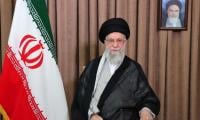Weakening the ISI
The Bush administration is playing a dangerous game by encouraging the elected government in Pakista
By Ahmed Quraishi
August 05, 2008
The Bush administration is playing a dangerous game by encouraging the elected government in Pakistan to pick an unnecessary confrontation with the country's powerful military. And by being willing to play along, the government of Prime Minister Yousuf Raza Gilani is failing the first test of any government: to passionately defend Pakistan's interest at all costs.
Even more disturbing is that no Pakistani official – including our esteemed prime minister – dared tell the Americans, even at the level of Richard Boucher if not to Bush's face, to desist from trying to open a new front of instability in Pakistan. The military will have to remain vigilant because there is every indication that attempts are underway to provoke it into a rash action, like removing the government, to give Washington an excuse to go for overkill, which could include military-specific sanctions, especially targeting the ISI.
To become a willing fourth pillar in the triangular anti-ISI campaign by Karzai, India and the Bush administration, the Gilani government is not only committing a great blunder, it is also becoming complicit in what is now a clear American objective to downsize Pakistan geographically and militarily in favour of strengthening India, containing China and Russia, and securing the Central Asian theatre.
Wafting through Islamabad these days is the unmistakable stench of conspiracy. After all, it's not possible that the three major heads in the PPP government – Mr Zardari, Mr Gilani, and Mr Rehman Malik – didn't know that their covert July 26 decision on ISI would not pass. They knew it won't. That explains the decision's timing: late weekend night when the three were out of the country. The move was unquestionably linked to the Bush meeting in Washington where the ISI topped the agenda. A coincidence? Not really.
The PPP government achieved three things: One, it showed the US that it at least tried and is willing to take risky moves if Washington's support is assured. Two, that it forced the military to resist the decision and emerge as the bad guy, which fits in with the current defamation campaign in the US media. And, three, it opened a public debate in Pakistan on the ISI – sort of similar to the one launched by the CIA propaganda machine in the US.
But apart from pleasing Washington and appeasing New Delhi, the PPP's decision exposed its inability to appreciate the difference between running a family-run political party and managing a nuclear power. This blunder strengthens the hand of those who believe the military cannot afford to completely withdraw from politics and transfer critical tasks to politicians such as oversight over intelligence and strategic assets.
The last thing that the country and its citizens needs is a debate over who should supervise the ISI. People need to understand the role of the spy agency for the solidarity and security of the country. The ISI is the first line of defence of Pakistan. The basic principle of handling sensitive information is that it should be known to as few people as possible – which is called a 'need-to-know' basis. Presently, outside the agency, sensitive information is known only to the prime minister. Those playing with the ISI do not understand the stakes. Weakening the agency means weakening the government of the day, then weakening the army and thus weakening the country. Normally, it is our enemies who would wish for this to happen.
The ISI informs the prime minister when there is any indication of danger to the country within 100 kilometres of Pakistani borders. The country cannot afford to channelize this information through bureaucracy and wait until it reaches the prime minister's desk. To defend the homeland, the prime minister needs to work closely and directly with the chiefs of the army, navy and the air force. The ISI chief should be directly responsible to the chief executive of the nation because there are many confidential matters that cannot go through many hands. Moreover, many people in government departments do not have the security clearance at a sufficient level to handle the information that comes from the ISI.
This is how the business of an important country like Pakistan is conducted. In comparison, the July 26 decision seems like a crude joke with the nation.
The writer works for Geo TV. Email: aq@ahmedquraishi.com
Even more disturbing is that no Pakistani official – including our esteemed prime minister – dared tell the Americans, even at the level of Richard Boucher if not to Bush's face, to desist from trying to open a new front of instability in Pakistan. The military will have to remain vigilant because there is every indication that attempts are underway to provoke it into a rash action, like removing the government, to give Washington an excuse to go for overkill, which could include military-specific sanctions, especially targeting the ISI.
To become a willing fourth pillar in the triangular anti-ISI campaign by Karzai, India and the Bush administration, the Gilani government is not only committing a great blunder, it is also becoming complicit in what is now a clear American objective to downsize Pakistan geographically and militarily in favour of strengthening India, containing China and Russia, and securing the Central Asian theatre.
Wafting through Islamabad these days is the unmistakable stench of conspiracy. After all, it's not possible that the three major heads in the PPP government – Mr Zardari, Mr Gilani, and Mr Rehman Malik – didn't know that their covert July 26 decision on ISI would not pass. They knew it won't. That explains the decision's timing: late weekend night when the three were out of the country. The move was unquestionably linked to the Bush meeting in Washington where the ISI topped the agenda. A coincidence? Not really.
The PPP government achieved three things: One, it showed the US that it at least tried and is willing to take risky moves if Washington's support is assured. Two, that it forced the military to resist the decision and emerge as the bad guy, which fits in with the current defamation campaign in the US media. And, three, it opened a public debate in Pakistan on the ISI – sort of similar to the one launched by the CIA propaganda machine in the US.
But apart from pleasing Washington and appeasing New Delhi, the PPP's decision exposed its inability to appreciate the difference between running a family-run political party and managing a nuclear power. This blunder strengthens the hand of those who believe the military cannot afford to completely withdraw from politics and transfer critical tasks to politicians such as oversight over intelligence and strategic assets.
The last thing that the country and its citizens needs is a debate over who should supervise the ISI. People need to understand the role of the spy agency for the solidarity and security of the country. The ISI is the first line of defence of Pakistan. The basic principle of handling sensitive information is that it should be known to as few people as possible – which is called a 'need-to-know' basis. Presently, outside the agency, sensitive information is known only to the prime minister. Those playing with the ISI do not understand the stakes. Weakening the agency means weakening the government of the day, then weakening the army and thus weakening the country. Normally, it is our enemies who would wish for this to happen.
The ISI informs the prime minister when there is any indication of danger to the country within 100 kilometres of Pakistani borders. The country cannot afford to channelize this information through bureaucracy and wait until it reaches the prime minister's desk. To defend the homeland, the prime minister needs to work closely and directly with the chiefs of the army, navy and the air force. The ISI chief should be directly responsible to the chief executive of the nation because there are many confidential matters that cannot go through many hands. Moreover, many people in government departments do not have the security clearance at a sufficient level to handle the information that comes from the ISI.
This is how the business of an important country like Pakistan is conducted. In comparison, the July 26 decision seems like a crude joke with the nation.
The writer works for Geo TV. Email: aq@ahmedquraishi.com
-
 Kelly Osbourne's Mom Sharon Receives 'shut Up' Call Accepting An Award For Late Hubby?
Kelly Osbourne's Mom Sharon Receives 'shut Up' Call Accepting An Award For Late Hubby? -
 Claude Overtakes ChatGPT On Apple App Store After Pentagon Dispute
Claude Overtakes ChatGPT On Apple App Store After Pentagon Dispute -
 What Happened To Ayatollah Ali Khamenei's Family During US -Israel Attack On Iran
What Happened To Ayatollah Ali Khamenei's Family During US -Israel Attack On Iran -
 BRIT Awards 2026 Winners Revealed
BRIT Awards 2026 Winners Revealed -
 Shia LaBeouf Arrested Again In New Orleans On Additional Battery Charge
Shia LaBeouf Arrested Again In New Orleans On Additional Battery Charge -
 Shamed Andrew Upset With THIS Family Member Over Current Condition
Shamed Andrew Upset With THIS Family Member Over Current Condition -
 Michael Jackson Estate Sued With Allegations Of Years Of Abuse From Late Singer
Michael Jackson Estate Sued With Allegations Of Years Of Abuse From Late Singer -
 Meghan Markle Shows ‘real Pain’ With Her Body Language In Jordan
Meghan Markle Shows ‘real Pain’ With Her Body Language In Jordan -
 Jennifer Garner Names Her Movie That She Hasn't Seen In Full Since Its Premiere
Jennifer Garner Names Her Movie That She Hasn't Seen In Full Since Its Premiere -
 Bridgerton’s Michelle Mao On Facing Backlash As Season Four Antagonist
Bridgerton’s Michelle Mao On Facing Backlash As Season Four Antagonist -
 King Charles Gets New ‘secret Weapon’ After Andrew Messes Up
King Charles Gets New ‘secret Weapon’ After Andrew Messes Up -
 Shia LaBeouf Makes Bold Claim About Homosexuals In First Interview After Mardi Gras Arrest
Shia LaBeouf Makes Bold Claim About Homosexuals In First Interview After Mardi Gras Arrest -
 Princess Beatrice, Eugenie ‘strained’ As They Are ‘not Turning Back’ On Andrew
Princess Beatrice, Eugenie ‘strained’ As They Are ‘not Turning Back’ On Andrew -
 Benny Blanco Addresses ‘dirty Feet’ Backlash After Podcast Moment Sparks Online Frenzy
Benny Blanco Addresses ‘dirty Feet’ Backlash After Podcast Moment Sparks Online Frenzy -
 Sarah Ferguson Unusual Trait That Confused Royal Expert
Sarah Ferguson Unusual Trait That Confused Royal Expert -
 Prince William, Kate Middleton Left Sarah Ferguson Feeling 'worthless'
Prince William, Kate Middleton Left Sarah Ferguson Feeling 'worthless'



